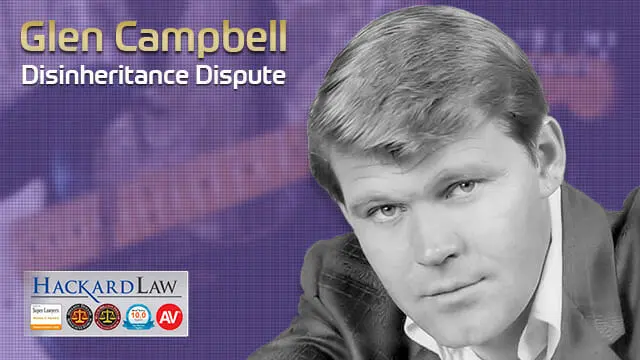
Glen Campbell | Estate Disinheritance Dispute
Country music legend Glen Campbell, author of hits like Wichita Lineman and Rhinestone Cowboy, lived a long and fruitful 81 years. At the time of his passing away from Alzheimer’s disease in August of 2017, he would leave behind some 60 studio albums as well as eight children from four different marriages. With royalties included, his estate has been estimated to reach a scale of $50 million, seemingly more than enough for all beneficiaries.
There was just one problem, though – Campbell disinherited three of his eight children in his 13-page will from 2006. For reasons unknown to the public, the country star specifically excluded daughter Kelli Campbell and sons William and Wesley Campbell from any sort of inheritance. Campbell designated his estate to wife Kimberly Campbell and his five remaining children.
Justified or not, disinheritance can come as a harsh blow to hopes of receiving estate or trust assets, whether that’s real property, cash, or future royalties in Campbell’s case. A few months after their father’s death, in January 2018, the three disinherited Campbell children filed legal action to challenge the will.
In July of this year, a judge in Nashville ruled that Kelli, William and Wesley could move forward with their case to contest their father’s will, including an accounting of all assets. Their main line of attack was Alzheimer’s disease – they contended that their father lacked the capacity to make estate decisions. But in 2006, Campbell was still performing regularly and seemed in good command of his memory and faculties. In fact, he was only diagnosed with Alzheimer’s four years later in 2010.
The three siblings’ effort to overturn Campbell’s will ended in November on unspecified grounds, but it’s likely they didn’t find anything pointing to their father’s incapacity 12 years prior. Kimberly, Glen’s surviving wife, expressed her “shock” at the initial lawsuit.
Glen Campbell’s story features several factors that can set off estate fights, including disinheritance, beneficiaries from multiple marriages, Alzheimer’s and a stepmother conflict with biological children. Even for a man like the Rhinestone Cowboy, there’s no guarantee of a conflict-free estate distribution. In the spirit of the Christmas season, let us work for reconciliation and resolution before it’s too late.
All of us, in one way or another, are confronted with life’s trials as challenges. It is my experience that family estate fights are especially painful and challenging. Participants to financial resolution of these fights generally don’t come away particularly happy. Tensions wrought from feelings of entitlement and feelings of betrayal are not easily allayed by settlement agreements. Fights over family inheritances bring battle scars – to the participants, their family members and to their attorneys.
All this said, trust and estate litigation is not the rule in estate administration and distributions, it is the exception. When the exception seems necessary, it is wise to consult with those familiar with its complexities.
In the end Glen Campbell’s surviving wife, Kimberly, talked about the need to refocus after an estate fight. She said she was “pleased to finally put this difficult experience behind me so that I may focus on my family, my continued mission to educate, destigmatize, and raise awareness for Alzheimer’s disease – and to honor my husband and his amazing music legacy.”
Before you go, please let me know if you’d like to receive a free copy of my book, The Wolf at the Door. Just send your address in an email to me at ha*****@********aw.com, and I’ll be glad to put one in the mail.

 (916) 775-8542
(916) 775-8542